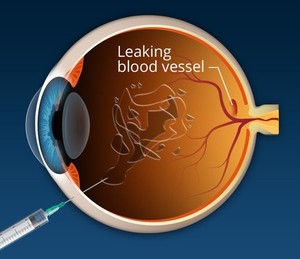The last decade and a half have witnessed a paradigm shift in the way vascular disorders affecting the retina are treated. Anti-vascular endothelial growth factor (VEGF) antibodies have become the mainstay of treatment. These monoclonal antibodies are injected in the vitreous cavity. For the treatment to be effective, repeated injections every 4 to 8 weeks over many years need to be given, which proves to be quite expensive.
Nearly 70% of patients requiring anti-VEGF therapy reside in the middle- and low income nations. Non-affordability of treatment is a major cause for non-compliance and discontinuation of therapy. Other causes that contribute to loss of follow-up are low socioeconomic conditions, low education level, lack of awareness about treatment and poor doctor‒patient communication. Thus, non-improvement of vision due to infrequent dosing is common.
One way to make treatment more cost effective and sustainable is to have more flexible dosing schedules with incentives to continue the treatment. The introduction of the ranibizumab similar biologic Razumab in India [1] has reduced the cost of the injection, thereby making it more feasible for a large section of the population to continue with long-term therapy.
Razumab is a recombinant humanized IgG1 kappa isotype monoclonal antibody fragment with a molecular weight of 48 kilodaltons. It is produced using an Escherichia coli (E. coli) expression system in a nutrient medium with tetracycline. In India, the approximate cost of a vial of Razumab is US$175, while for the originator ranibizumab (Lucentis) it is US$322. It was approved by the Drug Controller General of India (DCGI) in 2015 [1]. However, at that time, comparative data with other anti-VEGF agents was lacking.
Therefore, in order to provide such data, researchers from India retrospectively compared the results of originator ranibizumab, ranibizumab similar biologic and off-label bevacizumab in neovascular age-related macular degeneration (nAMD) and diabetic macular oedema (DME) [2]. A total of 202 patients received 3 injections followed by pro re nata dosing (timing left to the patient) and were analysed at 3 and 6 months. The ranibizumab similar biologic was seen to have comparable results compared to both originator ranibizumab and bevacizumab. Both nAMD and DME groups showed significant improvement at 3 months. These good outcomes were sustained at 6 months in nAMD, but not in DME. No significant difference was noted among the 3 anti-VEGFs. The baseline visual acuity (VA) dictated the final visual improvement. Poor baseline VA showed less visual gain.
Unlike a generic drug, the manufacturing process for similar biologics does not have a fixed chemical formula. They are produced from living cells under controlled conditions. Even slight variations in these conditions might lead to changes in safety and efficacy. Strict pharmacovigilance, post-marketing studies, reporting of adverse events and a risk management plan is mandatory for the final marketing approval.
The authors concluded that this study did not find any safety concerns with the similar biologic and its profile matched that of the originator ranibizumab.
Conflict of interest
The authors of the research paper [1] declared that there was no conflict of interest.
Abstracted by Dhanashree Ratra, Department of Vitreoretinal Diseases, Medical Research Foundation, Sankara Nethralaya, Chennai, India.
Editor’s comment
European Medicines Agency regulatory requirements ensure the same high standards of quality, safety and efficacy for biosimilars as for originator biologicals, and also include a rigorous comparability exercise with the reference product but they are not universally accepted by regulatory bodies outside of the European Union (EU). It should be noted that ‘similar biologics’ approved in India might not have been authorized if they had been subjected to the strict regulatory processes required for approval of biosimilars in the EU.
GaBI Journal Citation Impact
1.9 – CiteScore 2020 (calculated on 5 May 2021)
2.2 – CiteScoreTracker 2021 (Last updated on 6 March 2022)
Submit a manuscript to GaBI Journal
Related articles
Real-life clinical effectiveness of Razumab in wet AMD
Real-life clinical effectiveness of Razumab in retinal vein occlusion
| LATIN AMERICAN FORUM The new section of the ‘Latin American Forum’ on GaBI has been launched. The objective of this new section is to provide you with all the latest news and updates on developments of generic and biosimilar medicines in Latin America in Spanish. View this week’s headline article: Nomenclatura de biológicos y biocomparables en México Browse the news in the Latin American Forum! Register to receive the GaBI Latin American Forum newsletter. Inform colleagues and friends of this new initiative. LATIN AMERICAN FORUM Se ha lanzado la nueva sección del ‘Foro Latinoamericano’ sobre GaBI. El objetivo de esta nueva sección es brindarle las últimas noticias y actualizaciones sobre desarrollos de medicamentos genéricos y biosimilares en América Latina en español. Vea el artículo principal de esta semana: Nomenclatura de biológicos y biocomparables en México !Explore las noticias en el Foro Latinoamericano! Regístrese para recibir el boletín informativo GaBI Foro Latinoamericano. Informe a colegas y amigos sobre esta nueva iniciativa.
|
References
1. GaBI Online - Generics and Biosimilars Initiative. Biosimilars of ranibizumab [www.gabionline.net]. Mol, Belgium: Pro Pharma Communications International; [cited 2022 Mar 18]. Available from: www.gabionline.net/biosimilars/general/Biosimilars-of-ranibizumab
2. Ratra D, Roy K, Giridhar S, et al; Sankara Nethralaya Vitreoretinal Study Group. Comparison between ranibizumab biosimilar, innovator ranibizumab and bevacizumab in a real-world situation. Ophthalmol Ther. 2021 Nov 5. doi:10.1007/s40123-021-00416-4. Epub ahead of print.
Permission granted to reproduce for personal and non-commercial use only. All other reproduction, copy or reprinting of all or part of any ‘Content’ found on this website is strictly prohibited without the prior consent of the publisher. Contact the publisher to obtain permission before redistributing.
Copyright – Unless otherwise stated all contents of this website are © 2022 Pro Pharma Communications International. All Rights Reserved.








 0
0











Post your comment